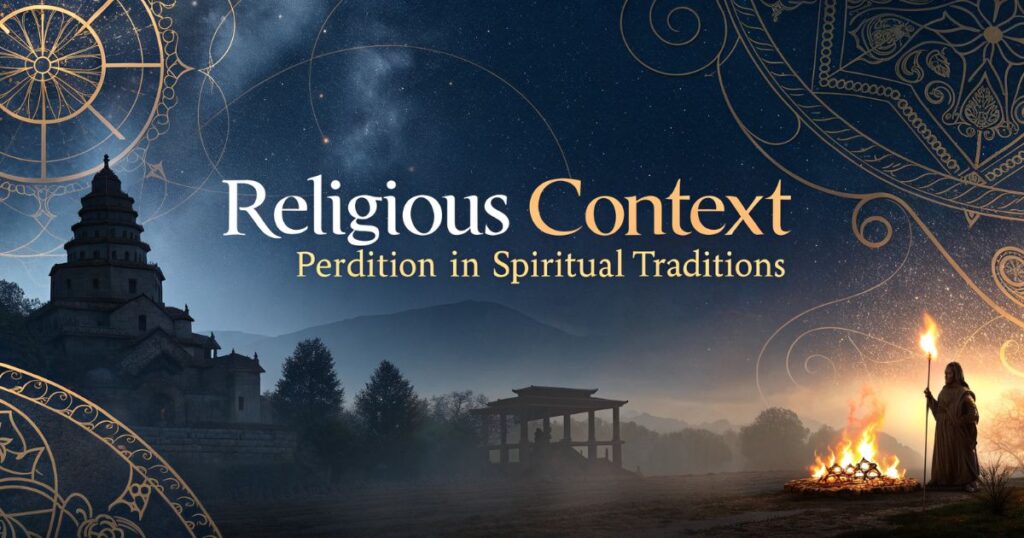Perdition haunts literature, religious texts, and dramatic conversations with its weighty implications of ultimate ruin.
This ancient word carries profound meaning that extends far beyond simple destruction into realms of spiritual, psychological, and existential devastation.
You’ll discover why mastering this powerful term elevates your vocabulary and deepens your understanding of human condition.
What Does Perdition Actually Mean?
Perdition fundamentally means complete and utter destruction or damnation. However, this definition barely scratches the surface of its rich complexity.
The word encompasses three primary meanings:
1. Spiritual Damnation: Eternal punishment or loss of salvation in religious contexts.
2. Complete Ruin: Total destruction of something valuable, whether material or abstract.
3. State of Being Lost: A condition of hopelessness or irreversible decline.
For example, you might say: “His gambling addiction led him down a path of perdition.” This usage captures both the destructive process and final ruined state.
The Historical Roots: Where Perdition Originated
Perdition springs from the Latin word “perdere,” meaning “to lose completely” or “to destroy utterly.”
Roman legal scholars originally used this term to describe total forfeiture of rights or property. The prefix “per-” intensifies the root “dare” (to give), creating the concept of giving away everything permanently.
During medieval times, Christian theologians adopted perdition to describe spiritual destruction. They transformed a legal concept into a theological warning about eternal consequences.
The word crossed into Middle English around the 13th century. Shakespeare later popularized its dramatic usage, cementing its place in literary tradition.
Perdition in Spiritual Traditions

Christian Interpretations
Christianity views perdition as the ultimate spiritual catastrophe. Biblical passages reference it as eternal separation from divine grace.
The Book of Philippians mentions “son of perdition” when describing Judas Iscariot’s betrayal. This phrase emphasizes complete spiritual ruin rather than temporary failure.
Dante’s “Inferno” masterfully illustrates perdition through nine circles of hell. Each level represents different aspects of spiritual destruction and moral collapse.
Protestant theology often emphasizes perdition as consequence of rejected salvation. Catholic doctrine traditionally connects it to mortal sin and refused repentance.
Other Faith Traditions
Islamic teachings contain parallel concepts of spiritual destruction. The Quran describes states of spiritual ruin that mirror Christian perdition.
Eastern philosophies approach destruction differently. Buddhism views suffering and attachment as paths toward spiritual dissolution, though not necessarily eternal.
Secular philosophy examines perdition through existential lenses. Thinkers like Sartre explored themes of self-imposed ruin and meaninglessness.
What is the Act of Perdition?
The act of perdition refers to behaviors, choices, or events that lead to complete ruin or destruction.
Personal acts include:
- Self-destructive addictions
- Betraying fundamental values
- Pursuing paths knowing they lead to ruin
- Abandoning moral principles for temporary gain
Historical examples demonstrate collective perdition:
- Nazi Germany’s systematic destruction of human dignity
- Environmental devastation through industrial negligence
- Financial corruption destroying entire economies
Modern psychology recognizes self-sabotaging patterns as forms of perdition. Individuals sometimes unconsciously choose destructive paths despite knowing better outcomes exist.
Corporate perdition occurs when organizations prioritize short-term profits over long-term sustainability. Enron’s collapse exemplifies how ethical compromises create institutional ruin.
Perdition in Literature and Pop Culture
Classic Literature
Shakespeare wielded perdition with devastating effect. In “Othello,” Iago’s manipulation leads characters toward emotional and spiritual perdition.
“Hamlet” explores perdition through moral paralysis and revenge. The prince’s journey illustrates how indecision can become its own form of destruction.
Milton’s “Paradise Lost” presents perdition as Satan’s chosen state. The fallen angel’s famous declaration “Better to reign in hell” embodies prideful acceptance of ruin.
Charles Dickens employed perdition to describe social conditions. His characters often face moral choices between redemption and continued decline.
Modern Media
Contemporary films frequently explore perdition themes. “The Godfather” trilogy shows how power corrupts across generations, leading families toward moral perdition.
Musicians reference perdition in various genres. Johnny Cash’s spiritual struggles and redemption songs often mention paths leading toward or away from ruin.
Video games like “Dante’s Inferno” directly adapt classical perdition imagery. Players navigate through layers of punishment and consequence.
Horror genres particularly embrace perdition concepts. Stephen King’s works frequently feature characters facing supernatural or psychological forms of ultimate destruction.
Synonyms and Related Terms
Direct synonyms for perdition include:
- Damnation: Specifically religious condemnation
- Ruin: General destruction or downfall
- Destruction: Physical or metaphorical annihilation
- Downfall: Process of decline toward ruin
Nuanced alternatives offer subtle differences:
- Catastrophe: Sudden, dramatic disaster
- Devastation: Complete destruction leaving emptiness
- Annihilation: Total obliteration without trace
- Obliteration: Wiping out completely
Context matters significantly. Spiritual perdition requires different synonyms than financial perdition or environmental perdition.
Avoid confusing perdition with “partition” (division) or “petition” (formal request). Pronunciation emphasizes the middle syllable: per-DISH-un.
How to Use Perdition in Modern Writing and Speech
Appropriate Contexts
Literary writing provides ideal opportunities for perdition. The word carries dramatic weight perfect for climactic moments or character revelations.
Academic discussions about theology, philosophy, or literature naturally accommodate perdition. Scholars studying religious texts or classical works encounter this term frequently.
Historical analysis often requires perdition when describing civilizations, movements, or individuals facing ultimate destruction.
Usage Examples
Formal writing: “The corporation’s ethical perdition began with seemingly minor accounting irregularities.”
Creative writing: “She watched her marriage spiral toward perdition, each argument pushing them deeper into mutual resentment.”
Historical context: “Many historians argue that Rome’s perdition resulted from internal corruption rather than external invasion.”
Avoid overusing perdition in casual conversation. The word’s gravity makes it inappropriate for minor setbacks or everyday problems.
Common Misconceptions About Perdition
Misconception: Perdition only refers to hell or afterlife punishment.
Reality: The word encompasses any form of complete ruin, including secular contexts like financial collapse or environmental destruction.
Misconception: Perdition always involves external punishment.
Reality: Many forms of perdition result from internal choices and self-destructive patterns rather than imposed consequences.
Pronunciation errors commonly occur. Some speakers say “per-DI-shun” instead of the correct “per-DISH-un.” The emphasis belongs on the second syllable.
Overuse warning: Using perdition for minor problems sounds pretentious. Reserve this powerful word for genuinely severe situations involving complete ruin or destruction.
Psychological and Philosophical Dimensions
Perdition represents more than external destruction. Modern psychology recognizes self-imposed ruin as significant mental health concern.
Self-sabotage patterns mirror classical perdition concepts. Individuals sometimes unconsciously choose destructive behaviors despite understanding consequences.
Addiction recovery programs address perdition themes directly. The “rock bottom” concept parallels religious ideas about reaching complete ruin before redemption becomes possible.
Existential philosophy examines perdition through meaninglessness and despair. Thinkers like Camus explored how individuals create their own forms of spiritual destruction.
Free will debates center on perdition’s ultimate responsibility. Questions arise about whether people choose their ruin or circumstances determine destructive outcomes.
Perdition vs. Similar Concepts
Perdition vs. Purgatory
Purgatory represents temporary purification before salvation. Perdition indicates permanent, irreversible destruction.
Catholic theology traditionally viewed purgatory as hopeful intermediate state. Perdition offers no such hope for eventual redemption.
Damnation vs. Condemnation
Damnation specifically involves divine judgment and punishment. Condemnation can be human disapproval without spiritual implications.
Perdition encompasses both concepts while adding elements of complete loss and ruin beyond simple judgment.
Ruin vs. Destruction
Ruin often suggests something valuable reduced to worthlessness. Destruction indicates physical obliteration.
Perdition combines both meanings while emphasizing the totality and finality of loss.
Real-World Applications
Academic Writing Enhancement
Perdition elevates scholarly discussions about:
- Religious studies and theological analysis
- Literary criticism examining tragic themes
- Historical accounts of civilizational collapse
- Philosophical explorations of human nature
Creative Storytelling Impact
Writers employ perdition to:
- Create dramatic tension in character arcs
- Establish high stakes for protagonists
- Explore themes of redemption and choice
- Add gravitas to climactic moments
Professional Communication
Rare but effective uses include:
- Corporate crisis communications
- Legal discussions of complete liability
- Environmental impact assessments
- Ethical business analysis
Choose perdition when you need maximum impact to describe total, irreversible destruction or loss.
The Future of Perdition
Environmental perdition discussions increasingly use this terminology. Climate change conversations reference planetary destruction using classical perdition imagery.
Digital age applications emerge as technology creates new forms of personal and social ruin. Social media addiction, privacy destruction, and information warfare represent modern perdition paths.
Corporate responsibility discourse adopts perdition when discussing institutional failures. Companies facing complete reputational destruction experience contemporary forms of perdition.
Mental health awareness connects self-destructive behaviors with classical perdition concepts. Therapists help clients recognize and interrupt patterns leading toward personal ruin.
Language evolution continues, but perdition’s power ensures continued relevance. The human experience of facing complete ruin remains constant across cultures and centuries.
Quick Reference Guide
Definition: Complete and utter destruction, ruin, or damnation
Pronunciation: per-DISH-un (emphasis on second syllable)
Primary contexts:
- Religious and spiritual discussions
- Literary and academic writing
- Dramatic emphasis situations
Key synonyms: Damnation, ruin, destruction, downfall
Avoid using for: Minor problems, everyday setbacks, casual conversation
Conclusion
Perdition transforms ordinary vocabulary into powerful communication tool capable of conveying ultimate destruction and irreversible loss.
Whether discussing spiritual damnation, personal ruin, or societal collapse, this ancient word carries unmatched gravity and precision. Master its usage thoughtfully, and you’ll possess linguistic capability to express humanity’s deepest fears about complete and utter devastation.
FAQs
1. What does the word “perdition” mean?
Perdition refers to a state of eternal damnation, ruin, or complete loss, often used in a religious or moral context.
It is most commonly associated with Christian theology, describing the final punishment of souls in hell.
In modern usage, it can also mean total destruction or irreparable downfall.
2. How is “perdition” used in literature and everyday language?
Writers often use “perdition” to convey deep despair, spiritual doom, or irreversible ruin.
For example, Shakespeare and Milton employed it in dramatic, moral, or religious contexts.
Today, it may appear in serious discussions, poetry, or even figuratively in daily speech.
3. What is the origin of the word “perdition”?
The term comes from the Latin word perditio, meaning “destruction” or “ruin.”
It entered English through Old French during the Middle Ages.
Its strong biblical and literary history has kept it alive in English for centuries.
More Posts
Copacetic Meaning, Definition, Common Usage, and Synonyms
1111 Meaning: Angel Number 1111 and the Idea of Pause
ETA Meaning: Exploring Its Importance in Different Contexts

Welcome to Brightnis! I am the admin and creator of this platform. I love questioning ideas and exploring different situations. My goal is to encourage critical thinking and help people see things from new perspectives. Join me in discussing thought-provoking topics and finding unique solutions to everyday challenges!
















